 Despite growing state controls and censorship, Chinese journalists are still finding ways to publish groundbreaking investigative reports about issues that matter to the Chinese people. After discussions with Mainland Chinese journalists, GIJN China has selected nine enterprising stories that showcase the best of Chinese muckraking last year.
Despite growing state controls and censorship, Chinese journalists are still finding ways to publish groundbreaking investigative reports about issues that matter to the Chinese people. After discussions with Mainland Chinese journalists, GIJN China has selected nine enterprising stories that showcase the best of Chinese muckraking last year.
Some stories focus on the fate of individuals who fell victim to a too-often unaccountable system; others try to untangle the obscure relationship between money and power. There are stories of fraud, crime, and a serial killer, as well as toxics and abuse by authorities. We likely missed many good stories, but here is an important record of China’s news media doing its best to expose social problems and hold power accountable.
The Paper: “The Illegal Trade in Problem Vaccines”
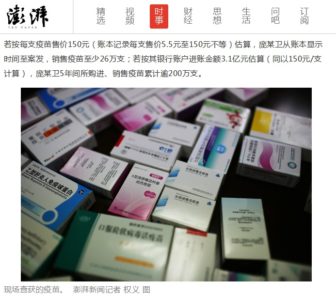 While on probation, Pang conspired with her daughter to trade non-refrigerated vaccines to 18 provinces, and made 570 million RMB from the trade. The vaccines were feared ineffective due to the improper transport and storage, though unlikely to cause toxic reaction.
While on probation, Pang conspired with her daughter to trade non-refrigerated vaccines to 18 provinces, and made 570 million RMB from the trade. The vaccines were feared ineffective due to the improper transport and storage, though unlikely to cause toxic reaction.
The Paper’s first reports followed the Food and Drug Administration’s investigation into Pang’s case and exposed the full list of people involved in the vaccines trade. Later, the series disclosed regulatory loopholes by uncovering how retailers, medical centers, and inoculation clinics profiteered through reselling the vaccines.
Caixin, Tencent “Prism,” National Business Daily: “Death of a Young Man — The Case of Wei Zexi”
Wei Zexi, a college student who suffered from a unique kind of malignant tumor, died in 2016, two years after he underwent several botched surgeries in an unqualified military hospital recommended by Baidu, China’s dominant search engine. The record of his treatment process, which was kept by Wei himself on Zhihu, the Chinese equivalent of Quora, caused a sensation in cyberspace and caught the media’s attention after his death.
A number of news organizations did exclusive reports on the hospital, detailing several of its treatments, operations, and its paid listing on Baidu search. The reports eventually prompted a thorough investigation into the dodgy practices of the “Putian medical network.”
Beijing News: The Case of Lei Yang: A Death in Custody
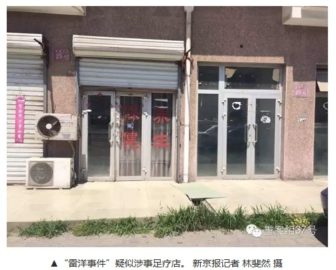
The shop where Lei Yang was caught for allegedly soliciting prostitution.
On his way to pick up relatives at the airport, Lei Yang, an environmentalist, died in police custody after being detained on suspicion of soliciting prostitution.
The Beijing News’ investigation questioned the police’s account of Lei’s death and revealed the possibility of police brutality. The case sparked national debate and anger, but discussions were soon suppressed and later banned on the internet by the government.
Under pressure, Lei’s family eventually dropped the case, accepted financial reparation from the police, and made no more comments.
Caixin, the Beijing News, CCTV Business: Toxic Running Tracks at Schools
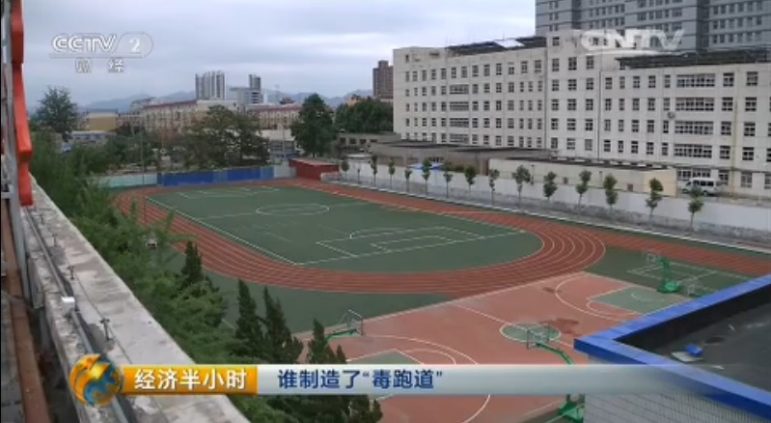
The “toxic” running track
A primary school in Beijing reported about a dozen cases of students falling ill last June. The symptoms were similar: nosebleeds, headaches, dizziness. Several media discovered that the newly installed, pungent running track might be the cause of the students’ ailments.
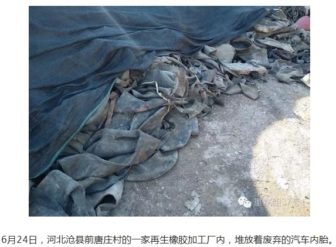
Waste rubber from old tyres were found in the grounds of one of the factories
CCTV Business’ reporter conducted an undercover investigation of factories that produced plastic running tracks in Beijing’s neighboring province, Henan, and revealed that the materials used in the factories were waste rubber from discarded tires and electric cables. Following investigations by other media, the problematic practices surrounding the industry from production to construction were laid bare, and triggered a public debate on reforming national industry standards for production of running tracks.
Beijing News: The Hidden Life of Serial Killer Gao Chengyong
In August, in a small store at a technical school in Baiying in northwest Gansu Province, 52-year-old Gao Chengyong was arrested for 11 murders he committed from 1988 to 2002 across two provinces. It had taken the police 28 years to identify him as suspect, finally closing in with the help of DNA technology.
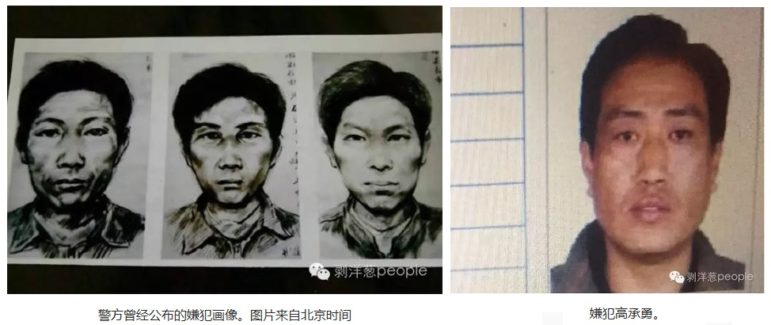
Left: Police composite sketch of then suspect. Right: Actual image of serial killer Gao Chengyong
This reporting series not only revealed details of the police investigation and arrest of Gao, but also traced 30 years of Gao’s hidden life and the decline of Baiying, a once-thriving industrial town plagued by the terror of his murder cases.
Caixin and news.163.com, Controversial Tycoon Chen Guangbiao
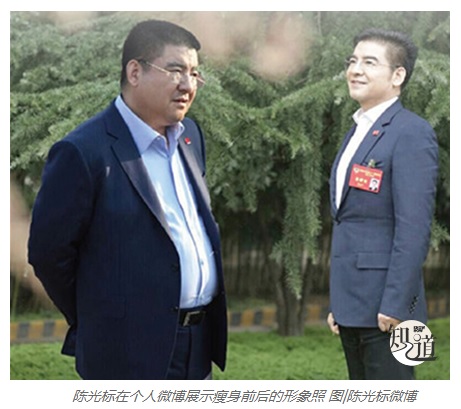
Chen Guangbiao’s “miraculous” weight loss
Chen Guangbiao, the self-proclaimed “most philanthropic person in China,” was taken away by the police in March on suspicion of counterfeiting official seals.
Starting from this incidence, Caixin’s one-year investigation into Chen’s business and philanthropic activities revealed more evidence of fraud. news.163.com revealed that Chen had undergone a gastrectomy to lose weight instead of consuming weight-loss pills manufactured by a company under his name, in order to dupe consumers into buying his products.
Beijing News: Who’s Behind the Baoli Nightclub?
In late December, Beijing police shut down three of the biggest nightclubs in town and detained hundreds of people based on their alleged involvement in prostitution. This report tried to unravel the mysterious and complicated finances behind one of the three closed nightclubs, Baoli.
Southern Metropolis Daily: “Nude Selfies for Loans”
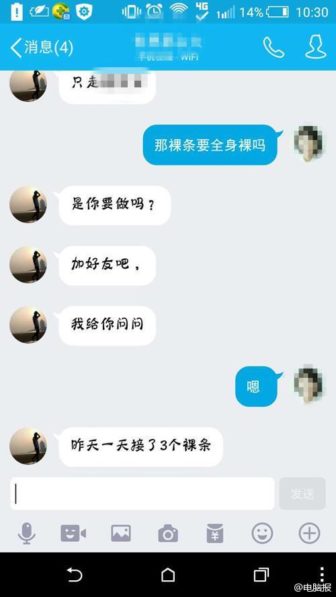
Text message between a loan shark and potential victim
In order to take out loans online, young girls from college are sending as collateral naked photos of themselves holding ID cards along with other personal information.
The nude pictures are often resold or used to blackmail the girls into repaying the loans with sex. Through an undercover investigation in an online chatting groups for loans, a Southern Metropolis Daily reporter unveiled this unsavory approach to online loans.
Henan Business Daily: The Case of Nie Shubin
Twenty one years ago, Nie Shubin, then a 21-year-old lad, was convicted and executed for rape and murder. Although this paper’s investigation into his conviction was done 11 years ago, it is deemed groundbreaking and meaningful particularly in 2016 because Nie was finally exonerated.
Henan Business Daily was the first media organization to dig out the historical files of Nie case, examine details of the police investigation, and report on the possibility of a wrongful conviction. After thorough digging, the newspaper sent its first story to hundreds of media organizations nationwide, inviting them all to publish simultaneously the next day, which successfully caused a national sensation.
